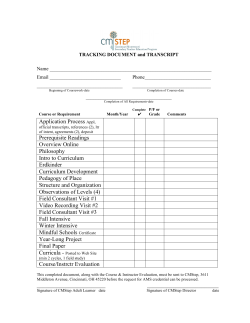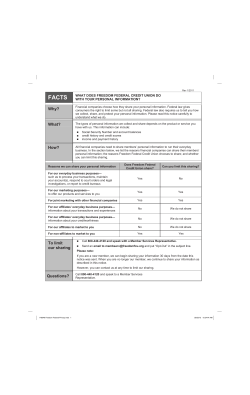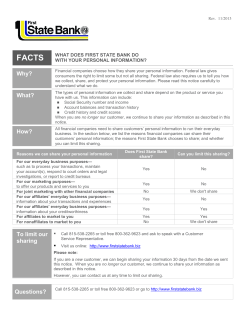
Advanced Interpretation of the WISC-V
Advanced Interpretation of the WISC-V Gloria Maccow, Ph.D., Assessment Training Consultant Advanced Interpretation of the WISC-V Gloria Maccow, Ph.D. Assessment Training Consultant Learning Outcomes Describe the cognitive abilities measured by the WISC-V index scores. Describe the theoretical link between cognitive processes and specific academic skills. Describe how to use performance on the WISC-V to generate hypotheses about processing deficits. 2 | Copyright © 2014. All rights reserved. Copyright © 2014. Pearson, Inc., or its affiliates. All rights reserved. 1 Advanced Interpretation of the WISC-V Gloria Maccow, Ph.D., Assessment Training Consultant Conceptual Structure 4 | Copyright © 2014. All rights reserved. Copyright © 2014. Pearson, Inc., or its affiliates. All rights reserved. 2 Advanced Interpretation of the WISC-V Gloria Maccow, Ph.D., Assessment Training Consultant WISC-V Index Scores and Contributing Cognitive Processes Full Scale IQ • Most reliable score – good predictor of important life outcomes. • Derived from a sum of 7 subtest scaled scores. • Considered the score that is most representative of global intellectual functioning (g). 6 | Copyright © 2014. All rights reserved. • Traditionally, FSIQ has been the first score to be considered in profile interpretation. 6 | Copyright © 2014. All rights reserved. Copyright © 2014. Pearson, Inc., or its affiliates. All rights reserved. 3 Advanced Interpretation of the WISC-V Gloria Maccow, Ph.D., Assessment Training Consultant Primary Index Scales The primary index scores, along with the FSIQ, are recommended for a comprehensive description and evaluation of intellectual ability. 7 | Copyright © 2014. All rights reserved. Abilities Measured by Primary Index Scales Index Abilities Measured Verbal Comprehension • • • • Word Knowledge Acquisition Information Retrieval Ability to reason and solve verbal problems Communication of knowledge Visual Spatial • • • • Visual spatial reasoning Synthesis of part-whole relationships Attentiveness to visual detail Visual-motor integration Fluid Reasoning • • • • Inductive and Quantitative Reasoning Broad Visual Intelligence Simultaneous Processing Abstract Thinking 8 | Copyright © 2014. All rights reserved. Copyright © 2014. Pearson, Inc., or its affiliates. All rights reserved. 4 Advanced Interpretation of the WISC-V Gloria Maccow, Ph.D., Assessment Training Consultant Abilities Measured by Primary Index Scales Index Abilities Measured Working Memory Ability to register, maintain, and manipulate visual and auditory information in conscious awareness. • Attention • Concentration • Mental Control Processing Speed • • • • • • • Short-term visual memory Visual-Motor Coordination Visual Discrimination Visual Scanning Concentration Cognitive Flexibility Rate of Test-Taking 9 | Copyright © 2014. All rights reserved. Ancillary Index Scales • Derived from combinations of primary subtests or primary and secondary subtests. 10 | Copyright © 2014. All rights reserved. • Provide additional information regarding a child’s cognitive abilities and WISC–V performance. 10 | Copyright © 2014. All rights reserved. Copyright © 2014. Pearson, Inc., or its affiliates. All rights reserved. 5 Advanced Interpretation of the WISC-V Gloria Maccow, Ph.D., Assessment Training Consultant Complementary Index Scales Complementary scales were designed to enhance the 11 | Copyright © 2014. All rights reserved. assessment of children with learning difficulties. 11 | Copyright © 2014. All rights reserved. Generate Hypotheses Twelve Male – Grade 6 (See WISC-V Score Report) Copyright © 2014. Pearson, Inc., or its affiliates. All rights reserved. 6 Advanced Interpretation of the WISC-V Gloria Maccow, Ph.D., Assessment Training Consultant Reasons for Referral His teachers report that Twelve has difficulty – listening and following directions, – reading grade-level text with comprehension, – meeting expectations in the preparation of compositions or written responses to demonstrate what he has learned, and – completing long-term assignments (i.e., book reports). Often, he is talking when he should be working. 13 | Copyright © 2014. All rights reserved. Reasons for Referral His parents report similar concerns at home. – Twelve often does not remember his chores, or he starts his chores and does not complete them. – He complains about assigned reading and refuses at times to complete written assignments. 14 | Copyright © 2014. All rights reserved. Copyright © 2014. Pearson, Inc., or its affiliates. All rights reserved. 7 Advanced Interpretation of the WISC-V Gloria Maccow, Ph.D., Assessment Training Consultant Demographic Information 15 | Copyright © 2014. All rights reserved. Full Scale IQ and Primary Index Scores 16 | Copyright © 2014. All rights reserved. Copyright © 2014. Pearson, Inc., or its affiliates. All rights reserved. 8 Advanced Interpretation of the WISC-V Gloria Maccow, Ph.D., Assessment Training Consultant Subtest Scores 17 | Copyright © 2014. All rights reserved. Primary Analysis Working Memory is a weakness relative to the MIS. 18 | Copyright © 2014. All rights reserved. Copyright © 2014. Pearson, Inc., or its affiliates. All rights reserved. 9 Advanced Interpretation of the WISC-V Gloria Maccow, Ph.D., Assessment Training Consultant Primary Analysis 19 | Copyright © 2014. All rights reserved. Primary Analysis Significant and unusual discrepancy between VCI-WMI VSI-WMI FRI-WMI WMI-PSI 20 | Copyright © 2014. All rights reserved. Copyright © 2014. Pearson, Inc., or its affiliates. All rights reserved. 10 Advanced Interpretation of the WISC-V Gloria Maccow, Ph.D., Assessment Training Consultant Primary Analysis 21 | Copyright © 2014. All rights reserved. Ancillary Indexes 22 | Copyright © 2014. All rights reserved. Copyright © 2014. Pearson, Inc., or its affiliates. All rights reserved. 11 Advanced Interpretation of the WISC-V Gloria Maccow, Ph.D., Assessment Training Consultant Quantitative Reasoning Index (88) AR • Requires computational ability and quantitative knowledge. • Loads on FRI, WMI, and VCI. 10 FW • Requires math in a more limited, abstract manner. • Examinee uses quantitative concept of equality to understand relationship among objects. 6 16 • Then, examinee applies concepts of matching, addition, and/or multiplication to identify correct response. 23 | Copyright © 2014. All rights reserved. Auditory Working Memory Index (81) 6 • WMI is based on the multi-component model. • Two domain-specific storage systems: – phonological loop, and – visual-spatial sketchpad. 7 13 The AWMI is a purer measure of auditory working memory. 24 | Copyright © 2014. All rights reserved. Copyright © 2014. Pearson, Inc., or its affiliates. All rights reserved. 12 Advanced Interpretation of the WISC-V Gloria Maccow, Ph.D., Assessment Training Consultant Nonverbal Index (106) • 11 Useful when examinee has obvious verbal difficulties 13 – ELL 10 – RELD, ELD – ASD with Language Impairment 10 11 10 • The processing speed component can affect results just like FSIQ. 65 • More emphasis on reasoning using visual-spatial processes than FSIQ. 25 | Copyright © 2014. All rights reserved. 25 | Copyright © 2014. All rights reserved. General Ability Index (109) 11 12 13 11 10 The GAI provides an estimate of general intellectual ability that is less reliant on working memory and processing speed than the FSIQ. 57 26 | Copyright © 2014. All rights reserved. Copyright © 2014. Pearson, Inc., or its affiliates. All rights reserved. 13 Advanced Interpretation of the WISC-V Gloria Maccow, Ph.D., Assessment Training Consultant Cognitive Proficiency Index (98) 6 10 10 13 39 The CPI provides an estimate of the efficiency with which information is processed in the service of learning, problem solving, and higherorder reasoning. 27 | Copyright © 2014. All rights reserved. Ancillary Analysis 28 | Copyright © 2014. All rights reserved. Copyright © 2014. Pearson, Inc., or its affiliates. All rights reserved. 14 Advanced Interpretation of the WISC-V Gloria Maccow, Ph.D., Assessment Training Consultant Complementary Indexes 29 | Copyright © 2014. All rights reserved. Naming Speed Index • The NSI provides a broad estimate of automaticity of basic naming ability drawn from a variety of tasks. • These tasks were developed to enhance the assessment of children with suspected learning disabilities and are not designed as measures of intellectual ability. 30 | Copyright © 2014. All rights reserved. Copyright © 2014. Pearson, Inc., or its affiliates. All rights reserved. 15 Advanced Interpretation of the WISC-V Gloria Maccow, Ph.D., Assessment Training Consultant Symbol Translation Index • The STI provides a broad estimate of visualverbal associative memory drawn from a variety of conditions. • These measures were developed to enhance the assessment of children suspected of having learning problems or declarative memory impairment. • These subtests were not developed as measures of intellectual ability. 31 | Copyright © 2014. All rights reserved. Storage and Retrieval Index • The SRI provides a broad estimate of long-term storage and retrieval accuracy and fluency. • It is derived from a variety of tasks designed to assess cognitive processes that are associated with reading, mathematics, and writing skills, and that have shown sensitivity to specific learning disorders and other clinical conditions. 32 | Copyright © 2014. All rights reserved. Copyright © 2014. Pearson, Inc., or its affiliates. All rights reserved. 16 Advanced Interpretation of the WISC-V Gloria Maccow, Ph.D., Assessment Training Consultant Complementary Analysis 33 | Copyright © 2014. All rights reserved. Process Analysis 34 | Copyright © 2014. All rights reserved. Copyright © 2014. Pearson, Inc., or its affiliates. All rights reserved. 17 Advanced Interpretation of the WISC-V Gloria Maccow, Ph.D., Assessment Training Consultant Deriving Contrast Scores 35 | Copyright © 2014. All rights reserved. Interpreting Contrast Scores See Appendix C in the WISC-V Technical and Interpretive Manual. 36 | Copyright © 2014. All rights reserved. Copyright © 2014. Pearson, Inc., or its affiliates. All rights reserved. 18 Advanced Interpretation of the WISC-V Gloria Maccow, Ph.D., Assessment Training Consultant Process Analysis 37 | Copyright © 2014. All rights reserved. Academic Achievement Based on his WISC-V profile, what are your hypotheses about Twelve’s academic achievement? 38 | Copyright © 2014. All rights reserved. Copyright © 2014. Pearson, Inc., or its affiliates. All rights reserved. 19 Advanced Interpretation of the WISC-V Gloria Maccow, Ph.D., Assessment Training Consultant Cognitive Processes Contributing to Academic Skills Reading-Related Processes Contributing Processes • Phonological Processing • Rapid Naming • Auditory Working Memory • Language Comprehension • Executive Functions • Visuospatial Abilities 40 | Copyright © 2014. All rights reserved. Copyright © 2014. Pearson, Inc., or its affiliates. All rights reserved. 20 Advanced Interpretation of the WISC-V Gloria Maccow, Ph.D., Assessment Training Consultant Cognitive Processes and Reading • Verbal comprehension and working memory were the best WISC–III/WISC–IV predictors of reading ability. • Children diagnosed with SLD-R show reduced verbal working memory (Kibby & Cohen, 2008) and processing speed deficits (Shanahan et al., 2006). 41 | Copyright © 2014. All rights reserved. Cognitive Processes and Reading • Rapid automatic naming measures, similar to Naming Speed Literacy, significantly predict reading ability in both younger and older children with reading disorder (Park & Lombardino, 2013). • Children with reading disorders perform poorly on verbal learning measures (Kibby & Cohen, 2008) and on paired associate learning tasks that involve pairing a visual input (i.e., a symbol) with a verbal response, that is, a word or nonword (Litt & Nation, 2014; Messbauer & de Jong, 2003). 42 | Copyright © 2014. All rights reserved. Copyright © 2014. Pearson, Inc., or its affiliates. All rights reserved. 21 Advanced Interpretation of the WISC-V Gloria Maccow, Ph.D., Assessment Training Consultant Special Group Study Results: Specific Learning Disorder-Reading N=30 Score Clinical Mean Control Mean Mean Diff P value Std. Diff VCI VSI FRI WMI PSI FSIQ QRI AWMI NVI GAI CPI NSI STI SRI 89.1 93.3 92.5 87.8 93.0 88.9 92.2 90.1 89.6 90.0 88.6 88.4 91.8 87.4 100.7 101.6 101.9 104.1 100.3 102.0 102.7 101.2 102.6 101.6 102.7 101.6 101.5 101.9 11.63 8.27 9.40 16.23 7.37 13.07 10.57 11.07 13.03 11.63 14.17 13.14 9.63 14.55 <.01 <.01 <.01 <.01 .02 <.01 <.01 <.01 <.01 <.01 <.01 <.01 <.01 <.01 .98 .62 .77 1.52 .50 1.06 .80 1.14 1.04 .96 1.09 .95 .80 1.23 43 | Copyright © 2014. All rights reserved. Math-Related Processes Contributing Processes • Attention • Visual-Spatial Processing • Working Memory • Language Comprehension • Executive Functions 44 | Copyright © 2014. All rights reserved. Copyright © 2014. Pearson, Inc., or its affiliates. All rights reserved. 22 Advanced Interpretation of the WISC-V Gloria Maccow, Ph.D., Assessment Training Consultant Cognitive Processes and Math • Difficulties in verbal comprehension, working memory, and processing speed (Willicutt et al., 2013). • General cognitive functioning, processing speed, and components of working memory are longitudinal predictors of math achievement (Geary, 2011). • Difficulties with working memory (Geary, 2010), attention (Raghubar et al., 2009), and semanticretrieval and visuospatial skills (Cirino, Morris, & Morris, 2007) are related to mathematics difficulties. 45 | Copyright © 2014. All rights reserved. Cognitive Processes and Math • Early number skills and conceptual reasoning skills predict math achievement (Fuchs, Geary, Compton, Fuchs, Hamlett, & Bryant, 2010). • Language, nonverbal reasoning, and attention are significantly related to performance on math word problems (Fuchs, Geary, Compton, Fuchs, Hamlett, Seethaler, et al., 2010; Tolar et al., 2012). 46 | Copyright © 2014. All rights reserved. Copyright © 2014. Pearson, Inc., or its affiliates. All rights reserved. 23 Advanced Interpretation of the WISC-V Gloria Maccow, Ph.D., Assessment Training Consultant Special Group Study Results: Specific Learning Disorder-Math N=28 Score Clinical Mean Control Mean Mean Diff P value Std. Diff VCI VSI FRI WMI PSI FSIQ QRI AWMI NVI GAI CPI NSI STI SRI 90.3 85.4 82.2 88.7 90.2 83.6 79.9 88.3 81.5 84.2 87.3 92.6 90.1 89.7 99.5 100.0 96.7 97.7 97.7 98.4 96.2 99.1 97.6 98.6 97.0 96.4 100.2 98.0 9.19 14.61 14.46 9.00 7.46 14.85 16.29 10.78 16.11 14.44 9.71 3.79 10.07 8.25 <.01 <.01 <.01 .07 .03 <.01 <.01 .02 <.01 <.01 .02 .36 .02 .03 .61 1.04 .91 .52 .50 1.04 1.09 .69 1.09 1.00 .63 .23 .63 .55 47 | Copyright © 2014. All rights reserved. WIAT-III Scores Composite/Subtest Standard Score Percentile Rank Basic Reading • Word Reading • Pseudoword Decoding 87 90 84 19 25 14 Reading Comprehension and Fluency • Reading Comprehension • Oral Reading Fluency 87 93 88 19 32 21 Mathematics • Math Problem Solving • Numerical Operations 110 110 108 75 75 70 Written Expression • Spelling • Sentence Composition • Essay Composition 82 78 88 90 12 7 21 25 48 | Copyright © 2014. All rights reserved. Copyright © 2014. Pearson, Inc., or its affiliates. All rights reserved. 24 Advanced Interpretation of the WISC-V Gloria Maccow, Ph.D., Assessment Training Consultant Integration of Data Relative Strengths Relative Weaknesses Verbal Reasoning Auditory Working Memory Visual-Spatial Reasoning Phonological Processing Abstract Thinking Reading Decoding Speed of Processing Spelling Math 49 | Copyright © 2014. All rights reserved. Eligibility Is Twelve eligible for direct specialized instruction? 50 | Copyright © 2014. All rights reserved. Copyright © 2014. Pearson, Inc., or its affiliates. All rights reserved. 25 Advanced Interpretation of the WISC-V Gloria Maccow, Ph.D., Assessment Training Consultant Ability–Achievement 51 | Copyright © 2014. All rights reserved. Cognitive Hypothesis Testing 52 | Copyright © 2014. All rights reserved. Copyright © 2014. Pearson, Inc., or its affiliates. All rights reserved. 26 Advanced Interpretation of the WISC-V Gloria Maccow, Ph.D., Assessment Training Consultant Cognitive Hypothesis Testing Processing Strength WISC-V Visual-Spatial Index SS = 105 A. Discrepant? Yes/No Achievement Weakness WIAT-III Spelling SS = 78 B. Discrepant? Yes/No Processing Weakness WISC-V Naming Speed Index SS = 78 53 | Copyright © 2014. All rights reserved. Another Set of Data Copyright © 2014. Pearson, Inc., or its affiliates. All rights reserved. 27 Advanced Interpretation of the WISC-V Gloria Maccow, Ph.D., Assessment Training Consultant Look at the Data • What questions do you have? • Should you compute the ancillary indexes? Why or Why Not? • Look at the pattern of scores. Consider abilities shared by several subtests and abilities unique to a subtest. • What follow-up testing would you recommend? 55 | Copyright © 2014. All rights reserved. Male, Grade 5, Age 10:5 WISC-V Index/Subtest Verbal Comprehension Composite Score/ Scaled Score WISC-V Index/Subtest Composite Score/ Scaled Score 88 76 Working Memory Similarities 6 Digit Span 6 Vocabulary 5 Picture Span 10 (Information) (7) (Letter-Number Sequencing) (5) (Comprehension) (6) Processing Speed 86 Visual Spatial 86 Coding 5 Block Design 5 Symbol Search 10 Visual Puzzles 10 (Cancellation) (9) Fluid Reasoning 103 Matrix Reasoning 11 Figure Weights 10 (Picture Concepts) (Arithmetic) 9 (13) Full Scale IQ 77 56 | Copyright © 2014. All rights reserved. Copyright © 2014. Pearson, Inc., or its affiliates. All rights reserved. 28 Advanced Interpretation of the WISC-V Gloria Maccow, Ph.D., Assessment Training Consultant What Are Your Hypotheses Now? Verbal Domain Subtest Scaled Score Similarities 6 Similarities Multiple Choice 12 Comprehension 6 Comprehension Multiple Choice 15 Vocabulary 5 Vocabulary Multiple Choice 10 Picture Vocabulary Multiple Choice 10 Information 7 Information Multiple Choice 7 (WISC-V Integrated, 2015) 57 | Copyright © 2014. All rights reserved. Summary • Generate hypotheses based on referral concern. • Identify patterns in the WISC-V data. • Confirm or refute hypotheses. • Generate follow-up questions. • Determine what needs to be done to answer questions. 58 | Copyright © 2014. All rights reserved. Copyright © 2014. Pearson, Inc., or its affiliates. All rights reserved. 29 Advanced Interpretation of the WISC-V Gloria Maccow, Ph.D., Assessment Training Consultant Customer Service 1-800-627-7271 (USA) 1-866-335-8418 (Canada) Webinar-Specific Questions Gloria Maccow, Ph.D. gloria.maccow@pearson.com www.psychcorp.com Copyright © 2014. Pearson, Inc., or its affiliates. All rights reserved. 30
© Copyright 2025











